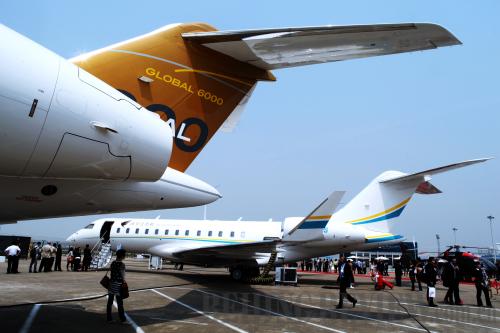|
 |
|
PRIVATE JET SHOW: The Asian businesscraft exhibition is held in Shanghai from April 16 to 18. A total of 30 luxury businesscrafts were on display during the event (CFP) |
Rich Chinese also desire the sea. The market value of China's yacht sector totaled 1.75 billion yuan ($283.9 million) in 2012. Italy and Britain are major exporters to China's yacht market, according to Fortune Character's China Yacht Report.
Premium cars are in high demand, too. Already the largest car market overall since 2009, China ranks second to the United States as the premium auto market. According to a report by McKinsey, 1.25 million units of cars worth over 200,000 yuan ($32,440) had been sold in China by the end of 2012. The premium auto market is likely to surpass that of the United States as early as 2016.
In 2012, Bentley sold 8,510 vehicles worldwide. Among the total, 2,253 were sold in China, the brand's second largest market. A total of 73,347 units of Jaguar Land Rover were sold in China, surging 73 percent year on year, making China its top market.
Mark Bishop, Group Director of Jebsen & Co. (China) Ltd., one of the biggest dealers of Porsche in China, told Beijing Review that he is absolutely confident in China's luxury car market despite a cooling of the economy last year.
As a luxury brand proudly labeled "Made in Germany," Porsche entered the Chinese mainland market in 2001 to enormous success. A total of 31,205 Porsche cars were sold on the Chinese mainland, and in Hong Kong and Macao, surging 28.2 percent year on year in 2012.
"People buy luxury products because they are a sign of wealth and success. It's not all about how you made the car. It's about what it represents and what the badge on the front of the car means. We have invested tremendously in China and will continue to do that. I see nothing today that worries me in China," said Bishop.
Room for local brands?
With such massive luxury market potential, can Chinese companies build up successful brands and snare a piece of the sector dominated by foreign players?
Some of them are heading in that direction. In November 2011, Chery Automobile, a Chinese auto company, announced a joint venture with Jaguar Land Rover to develop better-functioning engines. In 2010, Geely, a Chinese auto maker based in east China's Zhejiang Province, bought 100-percent share in Sweden-based Volvo.
"It's a good, brave and strong move for Geely," Bishop told Beijing Review, adding that he believed in the future of Chinese homegrown luxury brands. "It's unlikely that they will let go of this huge market," he said. "It's only a matter of time. Everything in China is a matter of time. They will get there."
However, many are less optimistic.
Chinese luxury brands are far from winning the hearts and minds of those at home and abroad. A survey conducted by the Luxury Research Center with the Beijing-based University of International Business and Economics showed that about 68 percent of respondents think there is no possibility for China to have successful luxury brands. The research center conducted the survey with over 2,000 Chinese consumers who frequently purchase luxury goods.
Jiang, the Beijing-based private equity analyst, agreed." Chinese people don't recognize China-made products. The country has to turn around its image of 'Made in China' as a source of low-quality cheap goods," adding that the system is not in place to truly cultivate and exploit young talented designers.
"Building up a luxury brand needs time," he said.
Email us at: zhouxiaoyan@bjreview.com | 